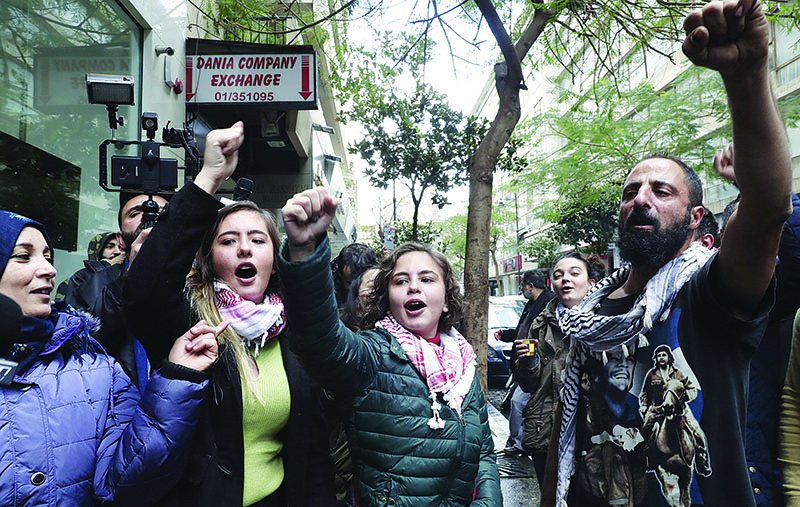

BEIRUT: Afterdecades of hard work, self-made Lebanese chocolatier Roger Zakhour thought hewould finally be able to pass a successful business to his daughter. But thenthe economic crisis hit. Instead of reaping profits this Christmas, he and his29-year-old daughter are marking down their handmade ice cream logs. "Ifit continues like this, in a few months I'll be bankrupt," the 61-year-oldsaid sitting in his small shop, surrounded by colorful stacks of hand-craftedchocolates.
In protest-hitLebanon, a free-falling economy, price hikes and a severe dollar liquiditycrunch have left local businesses struggling to stave off collapse. Zakhourstarted making chocolates and then ice cream in the 1990s, refining his recipesuntil he became a go-to for five-star hotels and well-off Lebanese.
As the economy worsened over the autumn, high-end hotels drastically reducedtheir orders and walk-in customers became rare. Banks have restricted access todollars since the end of the summer, sending prices soaring as importersstruggle to secure enough hard currency to buy supplies.
Meanwhile,Lebanon's central bank governor said "nobody knows" how much more thecost of dollars could rise on the black market as a dire crisis piles pressureon a 22-year-old currency peg. Deep in political turmoil, Lebanon is grapplingwith its worst economic crisis in decades and battered confidence in itsbanking system. The risk of devaluation has risen in a country with one of theworld's biggest foreign debt burdens.
The Lebanesepound has weakened by more than 30 percent on the parallel market, now the mainsource of cash. Banks have imposed tight controls, and the hard currency squeezehas driven importers to hike prices. "We hope the country itself willimprove so that the economy can improve," Central Bank Governor RiadSalameh told reporters after a meeting with parliament's finance and budgetcommittee on Thursday. When asked how much higher the cost of dollars wouldrise, he said "nobody knows". He did not elaborate.
A Banque du Liban(BDL) spokesperson said Salameh's comments did not indicate any change in theofficial pegged rate and the central bank's policy remained to preserve it. Theremark "came in response to a question about the rate at exchange dealersspecifically." Salameh has ruled out a break in the peg, which fixes thepound at 1,507.5 to the dollar. He has pledged repeatedly to maintain it.
Last month,Salameh said the central bank had the ability to underpin the pound'sstability. He also said it would not go to exchange dealers to give themdollars to keep the official rate. Street exchange dealers were offeringdollars at above 2,000 Lebanese pounds in recent days. Banks, still dealing atthe official rate, have blocked nearly all transfers abroad and curbed dollarwithdrawals - including limits of $200 a week. The head of banking associationhas called the controls "a fence to protect the system" until thingsreturn to normal.
"We'reheading somewhere we never imagined we would," said Zakhour, who had justupgraded his kitchen when sales dropped off. Support fellow citizens In pursuitof high-quality products, Zakhour imports his ingredients, paying in euros ordollars. But with withdrawals restricted and no transfers abroad, that is nolonger viable. "Now when something runs out, that's it," he said.Unprecedented protests have swept Lebanon since October 17, with people fromall backgrounds demanding a complete overhaul of a political class they deemuseless and corrupt.
The governmentstepped down on October 29, but endless political deadlock has delayed a newone being formed to tackle the urgent need for economic reforms. Zakhour'sbusiness is just one of thousands struggling to stay afloat. Many Lebanese havebeen forced to close shop, and a large number have been fired or seen theirsalaries slashed by half, even as the cost of living increases.
Watching all this unfold, 31-year-old nursery school teacher Lea Hedary Kreidiand her family racked their brains to see how they could help. Shortly afterprotests started, they launched a group on Facebook called "Made inLebanon-The Lebanese Products Group" to encourage Lebanese to buy locallyproduced goods. In just two months, they amassed more than 32,000 members, whopost ads for locally or homemade goods, or ask for local alternatives toimported products.
'Made in Lebanon'
"We're usedto going shopping and buying what our mothers used to buy. We grab what's infront of us without checking if it's made in Lebanon or not," she said,seated at home by a sparkling Christmas tree. But there are locally madeoptions for numerous products, including detergent, shampoo, nappies, peanutbutter, ketchup, and children's building blocks. "I was surprised by howmany things there were that I didn't know about," said the mother of ababy boy. In her drive to support her fellow citizens, Kreidi now skips herusual supermarket in favour of nearby small grocers.
This Christmas,only the children in her family will be receiving presents, which will all bemade in Lebanon. In Beirut, bar managerRani Al-Rajji says he is also having to adapt-moving away from increasinglyexpensive imports while also remaining affordable. "As much as I can, I'mtrying to lessen the blow so our guests don't feel they've lost theirpurchasing power and can no longer afford to go out," said the43-year-old, who is also an architect.
To do this, heand his co-founders are trying to increase local brands from a fifth to arounda half of all bar and kitchen supplies. "We're trying to use localproducts for all those with an alternative made in Lebanon," he said,sitting at the bar. And they are also attempting to cut out unnecessary packagingand marketing costs, serving wine directly from the barrel and beer from thekeg. "We can't replace everything, but we can try to give Lebaneseproducts more life, encourage their consumption," he said. But somecash-strapped consumers say buying local is not their chief concern.
In a Beirutsupermarket, 35-year-old Mariam Rabbah clutched a nearly empty basket wonderingwhat to buy with her diminished salary. "Everything is more expensive andwe're now paid half," she said. "Now what we care about is ifsomething is cheap and good quality-not whether it's imported orLebanese." - Agencies

